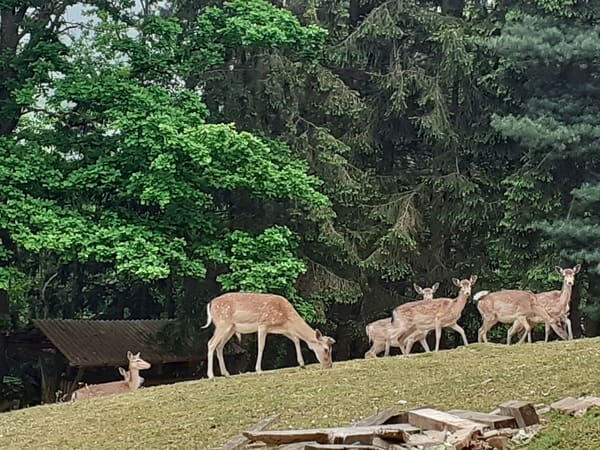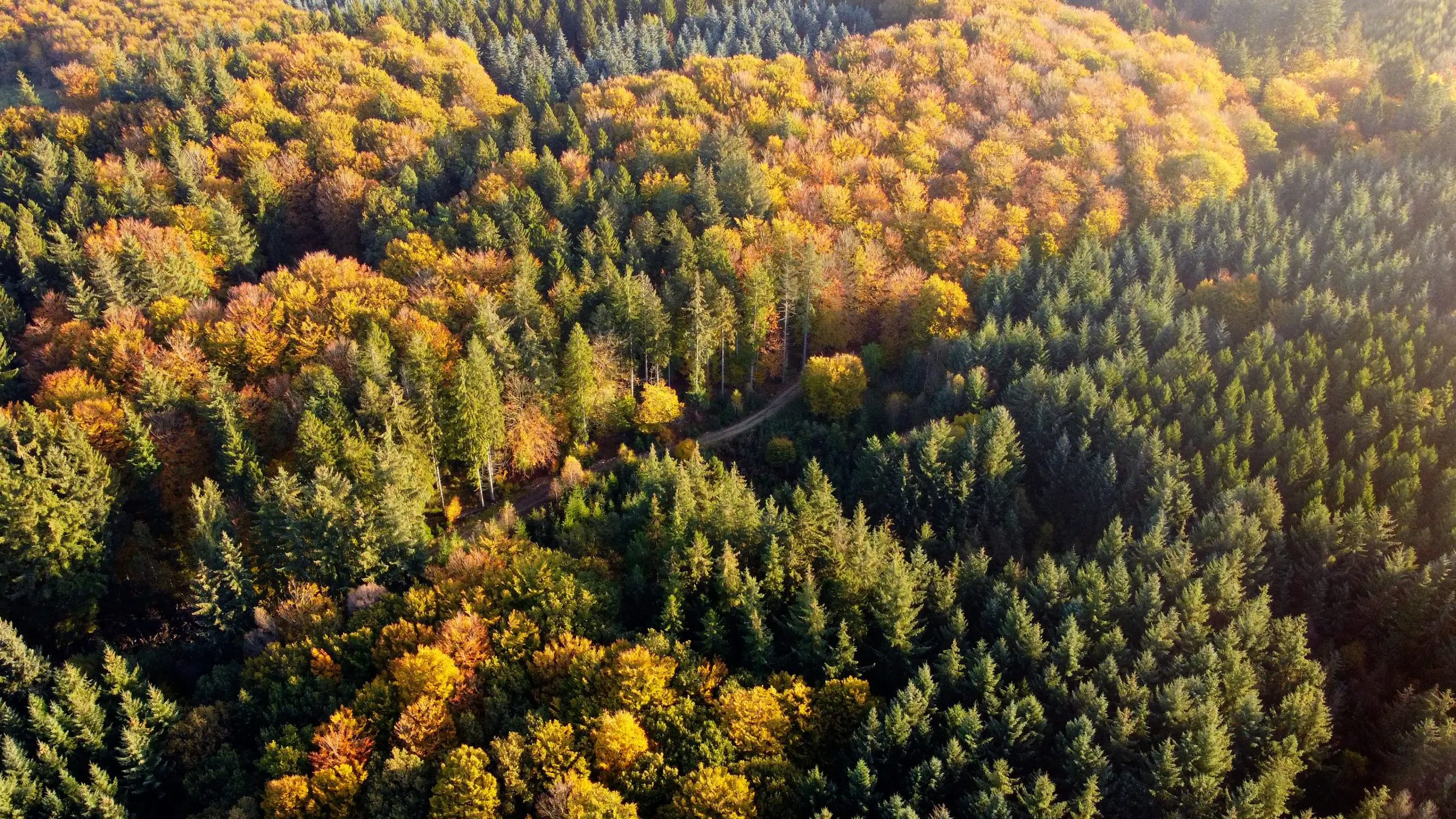
Biodiversity and fallow deer in Busovaca
In the municipality of Busovača, forester Jako Čavara produces mixed forest and breeds fallow deer for the benefit of bot tourism and the economy
Bosnia and Herzegovina (BiH) is the country with the highest proportion of forest, and the greatest diversity in types of forest, in the western Balkans. At the same time, this region is one of the most diverse in regards to forest types, in all of Europe. Forest resources cover 63% of the total land area and thus play an important role, for both the country’s economy and the local living conditions and standards. Together with the timber processing industry and agricultural industry, forestry is an important factor in the municipality and has a direct impact on the development and well-being of the inhabitants.
In Bosnia, about 20% of the forest area is privately owned. But this forest area is, for the most part, an unexploited resource. The property sizes are very small and often the ownership is either unknown or ambiguous, or the owners have no or only modest knowledge in regard to forestry. Moreover, the state bureaucracy is lacking transparancy, which makes makes issuing of transport- and harvesting permits a long, expensive, and for the people involved, almost immeasurable affair.
At Skovdyrkerne / DFE, we regard the creation of workers associations and labor unions an important instrument for influencing the authorities to improve the framework conditions of the private forestry sector, as well as improving the knowledge regarding responsible forest management. In October 2018, in cooperation with our local partner; Forestry Environmental Action (Fea.), at a founding general meeting, DFE established Bosnia’s first cantonal forestry association. Forestry has, since ancient times been cultivated in the municipality of Busovača. And the development of forestry has been continuously developed since then. It can be dated back hundreds of years to traces of charcoal burning over two millennia ago. The production of charcoal is a tradition that came to Bosnia from Italy. Charcoal burning was performed to extract tar and resin, and the coal was obtained as a by-product. Before the First World War, the development of forestry was influenced by the Austrian/Hungarian state, after which Bosnia developed the forestry itself. Charcoal burning is still a business in Busovača, Fojnica and Kreševo.
The value of uniting nationwide
Because most Bosnian forest owners administer smaller areas, forestry in Bosnia-Herzegovina is similar to forestry in Denmark in many aspects. The most significant difference is thus to be found on the organizational level.
Forest owner Jako Čavaraca lives near Kupres Village in the municipality of Busovača in Bosnia-Herzegovina. He owns and administers 6 ha of land in the Canton of Central Bosnia. The area has belonged to his family for generations and over time, they have extended their plot. Čavaraca underlines the value of having united in the Association of Private Forest Owners. The biggest challenge the Bosnian foresters face is unresolved property relations and the fragmentation of plots. A fragmented market and the negative impact of policy on forest management, which implies the absence of laws and other bylaws in this area, are other challenges the foresters face, Jako Čavaraca explains.
The Danish foresters are organized and represented through Skovdyrkerne. The value in being able to stand as on in a union of Danish foresters has been obvious to Danish foresters more than 100 years back. By organizing the Danish foresters secure political influence and public awareness on forestry related subjects and the rights and conditions of foresters. In Bosnia, no such thing as a forester’s union has existed up until recently. The organization of foresters in the Association of Private Forest Owners in the Canton of Central Bosnia, has had a direct effect in regards to Jako Čavaraca’s life and work as a forester; With the establishment of the Association of Private Forest Owners in the Canton of Central Bosnia certain shifts were noticed, which have been reflected in the greater interest of forest owners in solving the problems of forest management. Private forest owners are increasingly interested in enhancement of the quality of their forest estates, and they strive for the arrangement of documentation for resolving property-legal relations. The association has encouraged private forest owners to jointly address the issue of private forests and has encouraged the importance of private forests in a global perspective.” says Čavaraca.
The organizing of forest workers is important in order to gain political influence, but also to be heard and raise public awareness regarding the value of forests and the work of foresters. “The association has encouraged the private forest owners to collectively address the challenges they face and point to the value and importance of private foresters globally.”
Danish Forestry Extension works with the organization forestry and environmental action; fea. in short, in Bosnia. Since 2017 fea. has been working towards increasing the political influence of foresters in Bosnia-Herzegovina. fea. works to increase environmental awareness and secure responsible cultivation of forests and natural areas in collaboration with regional foresters and politicians. One of their most important tasks lies in the improvement of the framework conditions for private forest owners and forest workers through lobbying.
A solution with hooves
Jako Čavaras plot is located in a part of Bosnia that is particularly hilly. This brings up certain challenges concerning plantation:„Since the property consists of several plots that are at different altitudes and geological bases, the composition of tree species and the quality of the stands are different. Mixed forests of beech, fir and spruce dominate. The altitudes of plots varies from from 500 to 800 meters above sea-level. The plot on which the fallow deer farm was established is dominated by a coppice forest of hornbeam, birch and other deciduous trees of lower quality wood assortments. On the plot there are individual trees of sessile oak, fir and spruce as well as wild fruit trees (e.g. apple, cherry).“
The fallow deer has been part of the solution for making useful the less profitable parts of the plot. Apart from making use of these areas, the deer go hand in hand with Jako Čavaras vision concerning a higher level of biodiversity and sustainability on his plot. The demarcation of the area makes possible a larger variation of plants fungi and insects in the area.
”The fallow deer farm was established in the forest and land of poor quality and low economic value. The farm itself has contributed to increase the economic value of the area, with other effects such as tourism development, breeding and others. A quality relationship has been achieved between the contribution of nutritional abilities and breeding.“
Says Jako Čavara.
A fundamental balance
Jako Čavara doesn’t just reflect on sustainability in regard to his own forest and life as a forest owner. He has a general view on the value of sustainable forestry and manufacturing of woodrelated products as a condition for the well-being of humans in general. To him, sustainability is a fundamental balance, that must be present when working with nature;
„Sustainability is the balance of certain processes. In this case, it is related to sustainable management between biological and human factors. With the growing population, there is an obligation for biological and ecological systems to remain diverse, while providing the necessary productivity that will meet the growing demands. Accordingly, we encounter increasing unsustainable management of natural resources, through uncontrolled logging, environmental pollution, or waste disposal in the forest, and all this affects the water regime, air quality, etc. This imposes on us that the responsible use of natural resources is an increase in biodiversity.“
Jako Čavara is a qualified forest engineer of profession and hence sustainable development and responsible exploitation of natural resources is not only an area in which he has a great del of expertise, it is an area of great interest to him. Naturally being a forest owner is also running a business, but running that business Jako Čavaras focuses on doing it in a sustainable fashion. The profit is not all that matters. As Čavaras puts it himself; ”The economic significance of forest ownership is the use of wood forest assortments and non-wood forest products. The non-economic significance of forest ownership is a positive impact on the environment, by oxygen production, regulation of water regime, prevention of erosion, etc.“
He elaborates; „The main focus of forestry engineers, and for me personally, is the sustainable management of forest resources, which means seeking a balance between the economic benefits of forests and the further improvement of biodiversity.“
